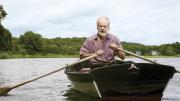While studying with Kurt Vonnegut at the Iowa Writers’ Workshop in the late 1960s, John Casey ’61, LL.B. ’65, enjoyed quite a range of experiences. A neighboring farmer taught him to castrate pigs; the next day in class he was reading Proust. Such contrasts were hardly a shock to the budding author. As a boy, he’d stayed in the New Hampshire woods with his Uncle Charlie, who taught his nephews to fish, hunt, and cross-country ski. Young Casey also frequented Paris, home to his Uncle Drew, a highly cultured gay man and denizen of the Left Bank who, with two of his equally cosmopolitan friends, took the boy around the City of Light. ”Then it was back to the woods,” he says. Now, at 75, Casey proffers a concise bio: “One-third of my life is writing and reading, one-third is getting outdoors, and one-third is…just life.”
The “just life” part includes his three marriages and four daughters. The rest of Casey’s trifecta shines in a pair of new books. Room for Improvement: A Life in Sport describes the wild outdoor adventures he has pursued across more than 50 years as an “adrenaline junkie.” Beyond the First Draft: The Art of Fiction is crammed with stories and ruminations on creative writing, a subject Casey (johndcasey.com) has taught at the University of Virginia since 1972. He knows the craft intimately, having published five novels, including Spartina, a summer saga of a coastal Rhode Island “swamp Yankee” and his adventures spearing swordfish, building a boat, and dealing with love, which won the 1989 National Book Award; one novella; and a raft of nonfiction that culminates in this year’s two-book salvo.
Their author is an unusual athlete. Though it involves some bona fide sports, Room for Improvement narrates an astonishing collection of what might be called adventures. At age 30, for example, he and his wife lived four years on an island in Narragansett Bay in a house without electricity, furnace, or telephone. One night there, Casey, rowing a skiff, guided a lost, and probably drunk, stranger’s yacht through two miles of rocky water to a marina. On his fiftieth birthday, he celebrated by walking 50 kilometers through the Blue Ridge Mountains from midnight to eight a.m. in January. Casey acknowledges the appeal of several popular incentives for athletic exploits: health, vanity, mastery, playfulness, and the siren song of endorphins. In addition, “I wouldn’t write if I didn’t read a lot,” he notes in Room’s preface. “I also wouldn’t write if I didn’t get out into the physical world in my own body, sometimes as a ‘sojourner in nature,’ as Thoreau puts it, but sometimes pushing hard enough to feel and see the earth’s surface differently.”
In the dead of winter, the 38-year-old endured an 11-day Outward Bound course in Maine. Casey opens this particular narrative by advising the reader, when out skiing, snowshoeing, or walking in snow, to “look at the nearest snowdrift and consider how you would do if you had to spend the night in it.” After noting the obvious misgivings anyone would have—like freezing to death, or just feeling plumb miserable—he adds that in his own case, he didn’t think of asking himself, “Will it be, in its peculiar way, fun?” Sure enough, for him, it was.
Room for Improvement’s bracing exploits suggest that the author does things just to see what happens: to encounter some unpredictable circumstance and find out what it offers. His quest might be simply to learn. Take the 70-kilometer trek Casey invented to mark his seventieth birthday: it embraced rowing, bicycling, skating, dog walking, and rollerblading, an athletic menu probably never attempted by another human. He savors rewards like “Redemption,” he writes. “There’s redemption of a bad day at the writing desk. Okay, that was five hours of nothing—let’s blow it off by running five miles.”
There have been more good days than bad at Casey’s desk during a prolific literary career. He started with a bang while at Iowa when the venerable William Maxwell bought three of his stories for The New Yorker. Beyond the First Draft narrates illustrative anecdotes and shares lessons gleaned from decades as a student and teacher of writing. He opens with the age-old question, “Can you teach someone to write?” and answers with two versions of “No,” both qualified: “No, but if someone is talented to begin with, I can save her a lot of time,” and “No, I can’t teach someone to write, but I can sometimes teach someone to rewrite.” Hence the title.
Casey compares fiction to acting, something he did plenty of in college, where he concentrated in Russian history and literature. In both, “There’s the same link between being cooped up in yourself and being let loose on a stage as somebody else,” he explains. Nor are you cooped up in yourself all that much when cross-country skiing at daybreak in Sweden, mollifying a huge black bear while trout fishing in Pennsylvania, or goaltending for a Swiss school ice-hockey team—as no one but John Casey can tell you.









